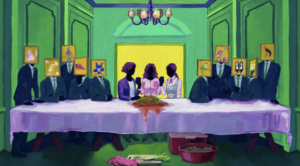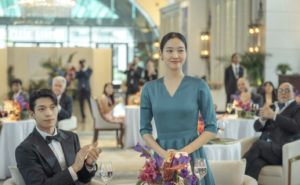
Helmed by Vincenzo director Kim Hee-won and penned by The Handmaiden writer Chung Seo-kyung, Little Women was set up to be a blockbuster from the start. Its strong cast with the likes of Kim Go-eun, Nam Ji-hyun, and Wi Ha-joon, as well as its intriguing title, further raised expectations for the drama, which thankfully did not disappoint.
Note: The following review contains spoilers.
The fast-paced 12-episode drama centres around the Oh sisters, who have lived in poverty since childhood, and struggle with absent, irresponsible parents. The eldest, In-joo (Kim Go-eun) is an accountant, while the middle child, In-kyung (Nam Ji-hyun) is a spunky journalist who chases down the truth at all costs. The youngest, In-hye (Park Ji-hoo) is a talented artist who is doted on by her sisters, to the extent that she feels burdened and suffocated by the numerous sacrifices they make for her.
When In-joo gets wrapped up in a suicide case and embezzlement of 70 billion won, the sisters quickly become entangled in a dangerous web of corruption and lies.
At its heart is the Jeongran society, headed by the ruthless politician Park Jae-sang (Um Ki-joon, in another Penthouse-villain type role) and his wife, Won Sang-ah (Uhm Ji-won). With their members having great influence over various sectors of society, they were formidable opponents for our main trio. Sang-ah, in particular, ends up being one of the most charming yet psychotic villains in K-dramaland, and Uhm Ji-won pulls off this role to perfection.
Unfortunately, in explaining the origin of the Jeongran society, Little Women tripped up on its insensitive depiction of South Korean involvement in the Vietnam war, which eventually caused the show to be removed from Netflix Vietnam.
Historical sensitivities aside, the rest of the writing was solidly handled. It was suspenseful throughout, with many mind-blowing twists thrown in at the most unexpected moments. The characters also remained consistent throughout the series, although they all achieved some measure of growth as well. In-joo is the clearest example of this–she starts off as a naive, financially illiterate, and irrational character who at one point lugs a huge backpack filled with 2 billion won all around Seoul, even abseiling off the walls of a psychiatric hospital with it. By the end of the drama, she is still trusting, though a little less naive; she is still financially illiterate but is much more aware of it, and finally gains some measure of ability to think ahead of her enemies, outsmarting them at crucial moments. Her love for her sisters and Hwa-young (played by the magnetic scene stealer Choo Ja-hyun), and her willingness to do anything for them stay as strong as ever, and this quality really endears her to viewers.

Kim Go-eun does a fantastic job with this role, ensuring that In-joo remains lovable even in her more ditzy moments, and conveying the full range of emotions In-joo experiences on this rollercoaster ride. Her chemistry with Wi Ha-joon (who plays the mysterious and sexy conman Choi Do-il) is also fantastic, injecting moments of humour, sweetness, and romantic tension in an otherwise dark drama.
There are many complicated relationships portrayed in this drama–Jae-sang’s and Won-ah’s highly dysfunctional codependent relationship, their emotionally abusive relationship with their daughter, Hyo-rin (Jeon Chae-eun), In-kyung’s relationship with her strict grand-aunt (Kim Mi-kyung)–but there are also relationships that stand out because of their simplicity. Hyo-rin’s and In-hye’s genuine friendship is one of the highlights of the drama. Despite them both having such troubled childhoods, they are able to find solace in each other, and grow to trust each other even when they can no longer trust anyone else. It is touching to witness how they came through for each other over and over again.
In-kyung’s childhood friend Jong-ho (Kang Hoon) is another shining beam of goodness among other morally grey characters–he is always supportive of her pursuits, even when they land him in danger, and remains steadfastly at her side through it all. These relationships are reminders that there is still hope to be had in an otherwise cruel and evil world. It is a pity and an irony, however, that the three sisters do not end up sharing many scenes together. In-hye, in particular, is often separated from her sisters, and while she proves to be very independent with her quick wit and fearlessness, it is quite unfortunate that her complex relationship with her sisters is left unresolved. The overly-attached and protective sides of In-joo and In-kyung disappear quite suddenly as well, as the show progresses.

Despite these flaws, what significantly elevates the drama is its spectacular cinematography and set design–the stylish way this drama is presented, with its beautiful shots and Kim Hee-won’s outstanding use of space and angles, make Little Women feel like a 12-hour movie. Even the animated opening sequence is rife with symbolism, filled with easter eggs that make more and more sense as the drama’s insane plot begins to unfold. Moments of significance are captured in meaningful close-ups, and each scene is purposeful and has its place. The fact that there is no lapse in quality throughout the drama is a feat in itself.
All in all, Little Women is a highly addictive and satisfying watch. The ambitious drama maintains the high standard it set from the start, and raises thought-provoking questions along the way about moral double standards, greed, and whether money can bring happiness. The incredible and committed performances of its cast, as well as its assured writing and directing, catapults this drama into one of 2022’s top offerings.
(Youtube. Images via tvN)


